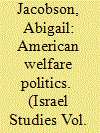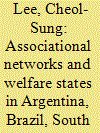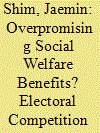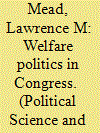|
|
|
Sort Order |
|
|
|
Items / Page
|
|
|
|
|
|
|
| Srl | Item |
| 1 |
ID:
119459


|
|
|
|
|
| Publication |
2013.
|
| Summary/Abstract |
This article discusses American involvement in Jerusalem during WW I, focusing on two American institutions active in the country and city at the time: the U.S. consulate and Consul Dr. Otis Glazebrook, and the American Colony in Jerusalem, an unofficial but important American institution. By examining these official and unofficial American "agents", this paper argues that the American involvement in the city can shed light on America's "welfare politics" in Palestine, whose traces can be tracked down until today. The "politics of welfare" offer many insights not only on war-time conditions in Jerusalem, but also provide a glance into American motivations of support and involvement in other areas in the Middle East. Using a variety of sources from the records of the American consulate and the American Colony, this paper analyzes the close connection between welfare, power, and political influence, demonstrated by the American case.
|
|
|
|
|
|
|
|
|
|
|
|
|
|
|
|
| 2 |
ID:
114498


|
|
|
|
|
| Publication |
2012.
|
| Summary/Abstract |
This article investigates the structures of civic networks and their roles in steering the political choices of party and union elites regarding the retrenchment or expansion of welfare states in four recently democratized developing countries. Utilizing coaffiliation networks built upon two waves of World Values Surveys and evidence from comparative case studies for Argentina, Brazil, South Korea, and Taiwan, the study develops two explanatory factors that account for variations in welfare politics: cohesiveness and embeddedness. In Argentina and, to a lesser degree, in Taiwan, party and union leaders' cohesive relationships, being disarticulated from the informal civic sphere, allowed them to conduct elite-driven social policy reforms from above, by launching radical neoliberal reforms (Argentina) or by developing a generous transfer-centered welfare state (Taiwan). In Brazil and South Korea, however, party and union leaders' durable solidarity embedded in wider civic communities enabled them to resist the retrenchment of welfare states (Brazil) or implement universal social policies (South Korea) based on bottom-up mobilization of welfare demands. This article demonstrates that elites in the formal sector make markedly different political choices when confronting economic crisis and democratic competition depending upon their organizational connections in formal and informal civic networks.
|
|
|
|
|
|
|
|
|
|
|
|
|
|
|
|
| 3 |
ID:
184759


|
|
|
|
|
| Summary/Abstract |
Drawing insights from legislative, electoral and welfare studies, the article investigates whether and to what extent electoral competition affects incumbent politicians’ overpromising of social welfare benefits. For this, Taiwan is chosen as the case and the article examines the fate of elite-level social welfare legislative proposals in the period between 1992 and 2016. Findings drawn from quantitative bill sponsorship patterns demonstrate that political elites tend to propose failure-prone social welfare bills during election periods. Moreover, this tendency grew even more clearly in tandem with the rising levels of electoral democracy. The article argues that the overpromising of social welfare benefits is likely due to cognitive biases on the voter side allowing politicians to make promises without necessarily facing the negative consequences of under-delivery. The article contributes to the comparative welfare state literature by adding much-needed nuance to the existing debates on the relationship between democratic deepening, electoral competition, and the development of welfare politics.
|
|
|
|
|
|
|
|
|
|
|
|
|
|
|
|
| 4 |
ID:
105430


|
|
|
|
|
| Publication |
2011.
|
| Summary/Abstract |
The stakes of political conflict involve contending values and issue definitions as well as policy. Welfare reform was the most important change in American domestic policy since civil rights. Its significance hinges crucially on how participants understood the issue, but existing research fails to resolve what their perceptions were. Most accounts suggest that welfare reform was an ideological contest concerning the proper scope of government, but there are other views. This study gauges the welfare agenda rigorously by coding speakers in congressional hearings on the basis of how they framed the issue and the position they took on it during the six chief episodes of welfare reform that occurred between 1962 and 1996. The reform efforts aroused four distinct divisions. Over time, positions moved rightward, but more important, the dominant issue changed: The ideological debate about government was overtaken by a more practical debate about how to manage welfare. This is the first study to track the substantive meaning of any issue in Congress over an extended period of time using hearing witnesses and a preset analytic scheme.
|
|
|
|
|
|
|
|
|
|
|
|
|
|
|
|
|
|
|
|
|